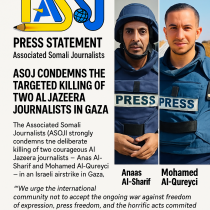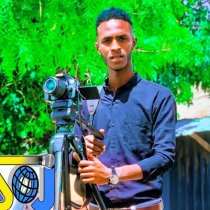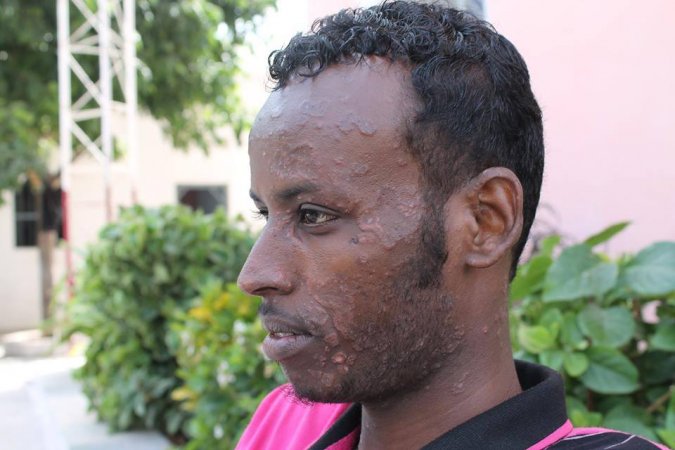
Visiting Research Fellow, Institute of Commonwealth Studies, University of London
Thank you to the organizers for inviting me again to speak at this annual
conference on the Horn of Africa, which this year focuses on post-conflict
peace-building.
I am here representing Amnesty International, a
politically and financially independent global movement of people who campaign
for internationally-recognized human rights to be respected and protected in
every country.
Amnesty International's vision is for every person to
enjoy all the human rights enshrined in the Universal Declaration of Human
Rights. It conducts impartial research on human rights observance or violations
by governments and armed groups, and takes action to prevent and end grave
abuses of human rights.
It works for freedom of expression and association, and protection from arbitrary detention and torture.
We campaign to stop violence and discrimination against women and minorities; to press for best standards of justice and no impunity for human rights violations; to abolish the death penalty; and to support international protection for refugees.
There have also been particular Amnesty International projects on the right to health and the right to shelter.
My own position at Amnesty International is Researcher on the Horn of Africa, covering Somalia , Somaliland , Eritrea , Ethiopia and Djibouti . There would be much to say about Sudan but that is the special expertise of other speakers, not myself.
At previous conferences, I have given recognition of the important work of
human rights defenders in these countries and spoken of the dangers they
face.
I am very pleased to inform you that Ethiopia's most prominent
human rights defender, Professor Mesfin Woldemariam, who is 76 years old and not
in good health, was just last month freed from 21 months' imprisonment and
political charges for which the prosecutor demanded the death penalty.
You will recall that this conference last year presented a petition to
the Ethiopian embassy in Sweden for his release as a prisoner of
conscience.
Opposition politicians and journalists were also freed
through a highly unusual pardon process – some were released only last week.
Sadly, two civil society activists tried with them still remain in
prison awaiting a verdict on 8 October.
They are Daniel Bekelle of
ActionAid, and Netsanet Demissie of the Organization for Social Justice in
Ethiopia .
They are human rights defenders as well as legal
professionals, and have been central in Ethiopian civil society action in the
Global Campaign Against Poverty.
I hope those of you who have been
involved in this important campaign will continue to press for their
unconditional release.
The dangers of doing legitimate human rights defence and peace work are also
illustrated by the murder in Somalia in July 2005 of Abdulqadir Yahya Ali,
director of the Centre for Research and Dialogue.
And in March 2007 Isse
Abdi Isse, head of Kisima Peace and Development Organization in Kismayu, was
murdered in Mogadishu by unidentified assailants while attending a UNICEF
conference on psycho-social support for children affected by civil war.
Last year's conference was about the role of the refugee diasporas from the
Horn in supporting human rights, promoting peace and reconciliation, and
supporting democratization and development – which are all
inter-connected.
Many in the audience then, as today, were asylum-seekers
or refugees, some still fearful of their governments and their embassies, all
starting new lives.
Like human rights defenders in each country of the
Horn, you are also stakeholders in peace-building, for the sake of a possible
return to your homeland, or, when that is not possible due to conflict or
continuing human rights violations, a positive involvement there from a distance
for the sake of the next generation.
This year's conference puts the spotlight on post-conflict peace-building in
the region.
Some of the conflicts have ended, others somehow persist
without endangering central state authority.
Somalia is still only part
way on the road out of years of failed statehood and conflict of rapidly
successive kinds of regional and indeed global significance.
To be sure,
reconstruction must not wait for full peace, but in Somalia the necessary major
international plans for reconstruction and development require a much greater
degree of political reconciliation and security than has yet been achieved.
Conflict in the Horn
The Horn in the last decade has been particularly affected by short-term or
long-term conflict of all kinds.
Conflicts have included an inter-state
border war between Ethiopia and Eritrea in 1998-2000; armed internal opposition
against the governments of Ethiopia, Eritrea, Djibouti and Somalia; civil wars
between faction leaders (known as warlords) in Mogadishu; Ethiopian military
intervention to support Somalia's Transitional Federal Government against the
Council of Somali Islamic Courts in late 2006; and inter-communal clashes over
resources based on “nationality”, ethnicity or clan in several
countries.
In all these conflicts, international humanitarian law – the
Geneva Conventions, which apply to both international and internal conflicts and
to both government forces and opposition groups – has been frequently violated
with impunity.
War crimes have been committed with impunity – killings
of civilians; killings, torture or ill-treatment of prisoners of war; rape; and
arbitrary detentions or hostage-taking.
Humanitarian workers responding
to humanitarian emergencies created
by conflict have also been killed or
kidnapped.
The perpetrators of these serious violations have been both government security forces and opposition forces – such as the Ogaden National Liberation Front (ONLF) which killed Chinese and Ethiopian civilians in an attack on an oil installation in April 2007.
Government reactions to opposition violence have commonly been arbitrary and
disproportionate, abandoning careful police investigation and fair trial in
place of illegal detentions, torture, unfair political trials
or violent
reprisals – which perpetuate the cycle of violence and set back peace-building.
This occurred recently in Ethiopia 's Somali Region after the ONLF
attack.
The security forces stepped up their counter-insurgency
operations, with reports of widespread arbitrary detentions, torture and
extrajudicial executions.
It expelled the International Committee of the
Red Cross (ICRC) from the Somali Region and closed down access to humanitarian
organizations and trade, which resulted in extreme economic hardship and rising
malnutrition.
The US “War on Terror” policy in the Horn has involved US forces in combating
“terrorism” within or emanating from Somalia during the period of the Islamic
Courts' rule in Mogadishu in mid-2006.
In pursuit of Al-Qaeda
operatives suspected of involvement in the bombings of US embassies and other
facilities in Kenya and Tanzania in 1998, US forces conducted at least two
bombing raids in southwest Somalia in January 2007 killing dozens of civilians.
The phenomenon of “renditions” – secret and illegal extraditions of
political suspects– has also appeared in the Horn, with Kenya detaining and
deporting to Somalia dozens of Kenyan Somalis and foreign nationals and
asylum-seekers allegedly involved with the Islamic Courts forces in
Somalia.
Most were then being rendered by Ethiopian troops in Somalia to
secret detention in Ethiopia , where they were interrogated by western
intelligence agencies.
Many have been released to their countries of
origin in the Middle East, North Africa, UK, Sweden, USA and other western
countries, but at least 40 and probably many more remain detained in secret
locations in Ethiopia, possibly to face secret trial by military courts.
The Ethiopian military intervention and its defeat of the Islamic Courts
forces in late 2006 led to the TFG beginning to establish itself in Mogadishu in
the face of continued clandestine armed opposition and assassinations.
Human Rights Watch has recently published its findings of investigations
in Mogadishu into violations of international humanitarian law by Ethiopian
forces in operations against TFG opponents.
The Ethiopian Foreign
Ministry cast aspersions on the report but failed to convincingly deny the main
charge which needs full independent investigation – that Ethiopian troops
arbitrarily and disproportionately fired on civilian areas, causing large-scale
casualties of civilians.
Human Rights Watch also criticised Islamist
opponents for war crimes such as firing from civilian areas and placing
civilians at risk..
The main victims of these conflicts have been civilians, especially the
vulnerable categories of women, children, minorities, internally displaced
persons and refugees.
There has also been massive infrastructure damage
affecting public utilities as well as people's safety and livelihoods.
Some businesspersons and warlords have profited from conflict but the
economic consequences for the majority of the people have been a major setback
for development, worse poverty, diversion of scarce resources to enriching arms
manufacturers and shadowy arms dealers, and creation of new humanitarian crises
and refugee flows.
In Somalia , international peace support was intended to play an important
role after the Kenya peace talks in establishing the Transitional Federal
Government (TFG) and taking Somalia away from the dangers to international
stability and security of being a collapsed state since 1991.
Ethiopian
troops who were reportedly called in by the TFG President have been the
principle force protecting the TFG and fighting armed clan-based and Islamist
opponents in Mogadishu .
A Ugandan contingent of 1,700 troops comprises
just a fraction of the intended African Union peace support force (AMISOM),
whose mandate has this week been renewed by the AU and UN for a second six
months.
Amnesty International urged that its mandate should include
prominently the protection of civilians, and that if it is succeeded by a UN
peacekeeping operation or a hybrid UN/AU force, this should have a strong and
defined human rights component.
In some of these conflicts in the Horn, there has been mediation or
peace-building with varying success: some by local political or religious elders
according to cultural traditions and local “laws of war”; some by local NGOs
established for this purpose (such as Somali Peaceline); some by international
NGOs (such as the Carter Centre) or faith groups (for example, the World Council
of Churches); and some by governments or inter-governmental organizations such
as the African Union, European Commission or UN.
Kenya provided the venue
and a facilitator for the Somalia Peace and Reconciliation conference in 2002-4,
which was sponsored by IGAD (Inter-Governmental Authority for Development),
after 13 previous peace talks had failed.
The current National Reconciliation Congress in Mogadishu is gradually
getting going, with some international support.
It might lead to some
form of a renewed national political settlement between the TFG and certain
opponents – former Islamic Courts elements who might be ready to abandon
violence, defectors from the TFG, and members of the self-styled “Free
Parliament” based in Eritrea .
Whether this will have an impact on the
current insurgency is a major question.
The political and military tensions between Ethiopia and Eritrea since the
border war have dismayed the international community.
Ethiopia and
Eritrea fought a two-year border war in 1998-2000, with huge military casualties
and leaving unresolved compensation claims and apparent failure of an
international border commission judgment.
In the chequer-board pattern of
conflict in the Horn, whereby neighbouring countries frequently support their
enemy's enemy, Ethiopia gives political support to an Eritrean opposition
coalition which comprises former armed groups as well as political groups but is
not active militarily, while Eritrea provides political and possibly military
backing to a coalition of Oromo and Somali armed groups operating in Ethiopia –
the Oromo Liberation Front (OLF) and the ONLF.
Eritrea also, according
to the UN arms embargo panel report, provided military support to the Islamic
Courts against Ethiopia .
The Horn of Africa is not all a conflict zone. Some parts, particularly
Ethiopia 's Somali Region and the Oromia and Gambella Regions have been
embroiled in long-running conflict.
The connection between conflict and
human rights violations is varied and complex. But in fact many of the human
rights issues in the Horn are not directly conflict-related.
For example,
political imprisonment and torture in Eritrea were not a response to armed
conflict, though the context of forced military conscription and refugee flight
has some roots in the legacy of the war with Ethiopia and threats of exile armed
opposition.
Religious persecution in Eritrea of Christian evangelical
churches and even the official Eritrean Orthodox Church is not even a matter of
resistance to conscription, which was only a principle to Jehovah's Witnesses.
Likewise in Ethiopia , killings of demonstrators by the army and police
in 2005 and imprisonment of opposition leaders, journalists and human rights
defenders were the government's response to non-violent opposition. And
repression of the media and jailing of journalists in every country - Ethiopia,
Somalia, Eritrea, Somaliland, Puntland and Djibouti has rarely been anything to
do with conflict.
Yet abuses of human rights and the rule of law, exclusion and discrimination do underly many of the worst conflicts in the region, and have led to countless civilians suffering reprisals for armed attacks they were never involved in.
What can governments and civil society do to build and secure peace?
The following general proposals and messages from Amnesty International relate especially to Somalia , but also in various ways to most of the conflicts and post-conflict situations which will be discussed in more detail in conference papers and discussion.
To preventand reduce conflict, governments should make every effort to protect human rights and abide by the human rights treaties they have signed or ratified. First and foremost they should ratify and abide by the Geneva Conventions, and cooperate fully with the International Committee of the Red Cross (ICRC).
- All conflicts should be addressed by conflict prevention and conflict
resolution, mediation and negotiations through whatever appropriate means –
though difficult and complex, this will always be less costly than coping with
the consequences of conflict.
- Where peace talks are in process, there should be a role for civil society
and human rights defenders, rather than a simple power-and-resource-sharing deal
between opposing forces, some of which may have perpetrated war crimes and have
little commitment to national unity and reconstruction.
Civil society organizations sho;d orhanise themsleevs to play this role, as they represent populations who want an accountable and peaceful government to support.
- Peace talks should be based on the principle that there can be no
sustainable peace without human rights. Peace talks should include provisions
for human rights protection, so as to prevent repetition of war crimes and build
institutions to protect human rights in the future. Disarmament, Demobilization,
and Reintegration (DDR) of former armed groups during the formation and training
of new security, defence and policing institutions are particularly
important.
- Civil society should – and of course often does - demand a policy of
allowing no permanent impunity for war criminals and perpetrators of crimes
against humanity: even if the practical considerations of a transitional period
mean that warlords and war criminals are brought into a new temporary
government, this cannot be allowed to persist into a post-conflict period of
democratization and elections.
- Part of the process of “transitional justice” is that they should be justice
for the victims. New armed forces must screen out war criminals from past
conflicts, as a vital safeguard against new abuses.
- Finally, civil society peace groups should be given international support in advocating for peace and preparing civilian populations for peace.
Concluding remarks
Let me conclude by expressing the sincere hope that these issues of peace and
human rights will be actively taken up by speakers, panel chairs and
participants at this conference.
Let us hope that a similar conference
next year would be able to report major improvements and a massive reduction, if
not end, of conflict in the region.

 0
0 


























Visiting Research Fellow, Institute of Commonwealth Studies, University of London
Martin Hill Amnesty International Visiting Research Fellow, Institute of Commonwealth Studies, University of London